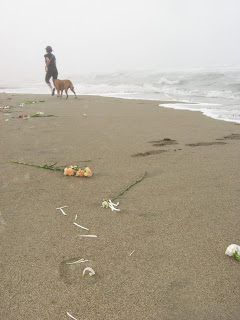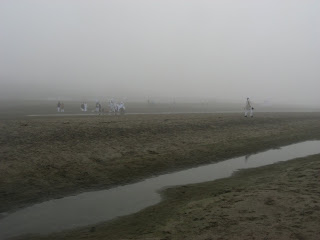





Today was the 15th Maafa Ritual at Ocean Beach. I awoke at 3:15 AM. I set my clock and my cell phone and my mind and woke on time. I still hadn't written my message for this year, after thinking about it before retiring the night before, the catalog for the exhibit Mami Wata: Arts for Water Spirits in Africa and Its Diasporas (currently up at the Cantor Museum at Stanford University) on the bed next to me. I was trying to see how to tie it in--water, black mermaid deity--hum? I also pulled Without Sanctuary: Lynching Photographs in America off the shelf for a little mood music--I didn't even get to the photos; the brutality of whites toward Sam Hose, in Leon F.Litwack's essay, "Hellhounds," stopped me. I just couldn't go on afterwards . . . and so I fell asleep after glancing briefly through Gem of the Ocean, August Wilson's first play in his 100 year history of black America, in ten-year cycles.
Black people are the gems of the ocean.
So there we stood this morning on the west coast recalling our ancestors taken from the west coast of Africa, Dr. Penn said in the guided meditation this morning. I thought about this as I breathed in peace and breathed out rage, eyes shut mind listening to the waves . . . their cleansing spirits washing over me, my hair dripping with their whispers . . . later they caught me unaware and like in the game of catch, I could feel the laughter . . . my feet wet.
The morning was light . . . tide so far out we couldn't see it. We knew it was there and after Sunrise and Ebun and another singer led us in the Maafa chant we made our way over the horizon for the treasure, which was there--just as we'd imagined.
Two visitors--friends of friends from Miami shared wonderful songs for the ancestors--both husband and wife drummers, while Haben's prayer in Amharic was an additional treat.
The drummers were in the house, strapped with djembes and djundjun . . . the egungun and other transcendental spirits were dancing. Our friends from Miami said the Atlantic doesn't dance like Pacific. . . .





